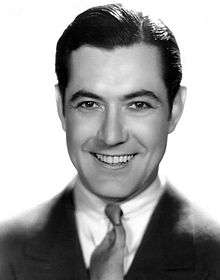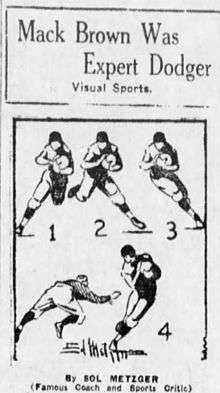Johnny Mack Brown
| Johnny Mack Brown | |
|---|---|
 Brown in 1935. | |
| Born |
September 1, 1904 Dothan, Alabama, U.S. |
| Died |
November 14, 1974 (aged 70) Woodland Hills, California, U.S. |
| Occupation | Actor |
| Years active | 1927–1966 |
| Spouse(s) | Cornelia "Connie" Foster (1926–November 14, 1974) |
|
College football career | |
| Alabama Crimson Tide No. 17 | |
| Position | Halfback |
| Career history | |
| College | Alabama (1924–1925) |
| Bowl games | |
| High school | Dothan |
| Personal information | |
| Height | 5 ft 11 in (1.80 m) |
| Weight | 160 lb (73 kg) |
| Career highlights and awards | |
| |
| College Football Hall of Fame (1957) | |
Johnny "Mack" Brown (September 1, 1904 – November 14, 1974) was an American college football player and film actor originally billed as John Mack Brown at the height of his screen career.[1] He was mostly in Western films.
Early life
Born and raised in Dothan, Alabama, Brown was a star of the high school football team, earning a football scholarship to the University of Alabama. His little brother Tolbert "Red" Brown played with "Mack" in 1925.
University of Alabama
While at the University of Alabama, Brown became an initiated member of the Kappa Sigma Fraternity.
Football
Brown was a prominent halfback on his university's Crimson Tide football team, coached by Wallace Wade. He earned the nickname "The Dothan Antelope" and was inducted into the College Football Hall of Fame. Pop Warner called him "one of the fastest football players I've ever seen."[3]
1924

The 1924 team lost only to Centre. Brown starred in the defeat of Georgia Tech.
1925
Brown helped his team to become the 1925 NCAA Division I-A national football champions. In that year's Rose Bowl Game, he earned Most Valuable Player honors after scoring two of his team's three touchdowns in an upset win over the heavily favored Washington Huskies. The 1926 Crimson Tide was thus the first southern team to ever win a Rose Bowl. The game is commonly referred to as "the game that changed the south."[4] Brown was selected All-Southern.[5]
Film career
His good looks and powerful physique saw him portrayed on Wheaties cereal boxes and in 1927, brought an offer for motion picture screen tests that resulted in a long and successful career in Hollywood. He played silent film star Mary Pickford's love interest in her first talkie, Coquette (1929), for which Pickford won an Oscar.
He appeared in minor roles until 1930 when he was cast as the star in a Western entitled Billy the Kid and directed by King Vidor. An early widescreen film (along with Raoul Walsh's The Big Trail with John Wayne, produced the same year), the movie also features Wallace Beery as Pat Garrett. Brown was billed over Beery, who would become MGM's highest-paid actor within the next three years. Also in 1930, Brown played Joan Crawford's love interest in Montana Moon. Brown went on to make several more top-flight movies under the name John Mack Brown, including The Secret Six (1931) with Wallace Beery, Jean Harlow, and Clark Gable, as well as the legendary Lost Generation celebration of alcohol, The Last Flight (1931), and was being groomed by MGM as a leading man until being abruptly replaced on Laughing Sinners in 1931, with all his scenes reshot, substituting rising star Clark Gable in his place. MGM and director Woody Van Dyke screen tested him for the lead role of Tarzan the Ape Man but Van Dyke didn't feel he was tall enough. [6]
_-_January_and_Brown.jpg)
Rechristened "Johnny Mack Brown" in the wake of this extremely serious career downturn, he made low-budget westerns for independent producers. Eventually he became one of the screen's top B-movie cowboys, and became a popular star at Universal Pictures in 1937. A fan of Mexican music, he showcased the talents of guitarist Francisco Mayorga and The Guadalajara Trio in films like Boss of Bullion City and The Masked Rider. Brown also starred in four serials for Universal (Rustlers of Red Dog, Wild West Days, Flaming Frontiers and The Oregon Trail) and was a hero to millions of young children at movie theaters and on their television screens.
Brown moved to Monogram Pictures in 1943 to replace that studio's cowboy star Buck Jones, who had died months before. Brown's Monogram series was immediately successful and he starred in more than 60 westerns over the next 10 years, often playing "Nevada Jack McKenzie" opposite Buck Jones's old sidekick Raymond Hatton. Brown was also featured in two higher-budgeted dramas, Forever Yours and Flame of the West, both released by Monogram in 1945 and both billing the actor under his former "dramatic" name, John Mack Brown.
When Monogram abandoned its brand name in 1952 (in favor of its deluxe division, Allied Artists), Johnny Mack Brown retired from the screen. He returned more than 10 years later to appear in secondary roles in a few Western films. Altogether, Brown appeared in more than 160 movies between 1927 and 1966, as well as a smattering of television shows, in a career spanning almost 40 years.
Personal life
Brown was married to Cornelia "Connie" Foster from 1926 to his death in 1974, and they had four children.
Awards
In recognition of his contribution to the motion picture industry, Brown was given a star on the Hollywood Walk of Fame at 6101 Hollywood Blvd. In 1969, Brown was inducted into the Alabama Sports Hall of Fame.
Death
Brown died in Woodland Hills, California of heart failure at the age of 70. His cremated remains are interred in an outdoor Columbarium, in Glendale's Forest Lawn Memorial Park Cemetery.
Selected filmography
- Slide, Kelly, Slide, 1927
- The Fair Co-Ed, 1927
- Our Dancing Daughters, 1928
- A Woman of Affairs, 1928
- The Divine Woman, 1928
- A Lady of Chance, 1928
- The Valiant, 1929
- The Single Standard, 1929
- Hurricane (1929)
- Coquette, 1929
- Billy the Kid, 1930
- Great Day, 1930 (incomplete & unreleased)
- Montana Moon, 1930
- The Last Flight, 1931
- Lasca of the Rio Grande, 1931
- The Secret Six, 1931
- The Great Meadow, 1931
- Fighting with Kit Carson, 1933 (12-chapter serial)
- Female, 1933
- Belle of the Nineties, 1934
- Branded a Coward, 1935
- The Courageous Avenger, 1935
- Rustlers of Red Dog, 1935 (12-chapter serial)
- Rogue of the Range, 1936
- Desert Phantom, 1936
- The Crooked Trail, 1936
- Wild West Days, 1937 (13-chapter serial)
- Born to the West, 1937
- Lawless Land, 1937
- Bar-Z Bad Men, 1937
- The Gambling Terror (1937)
- A Lawman Is Born, 1937
- Flaming Frontiers, 1938 (15-chapter serial)
- The Oregon Trail, 1939 (15-chapter serial)
- Boss of Bullion City, 1940
- Law and Order, 1940
- Law of the Range, 1941
- Deep in the Heart of Texas, 1942
- Ride 'Em Cowboy, 1942
- The Silver Bullet 1942
- The Lone Star Trail, 1943
- Law Men 1944
- Gun Smoke 1945
- Stampede, 1949
References
- ↑ Obituary Variety, November 20, 1974.
- ↑ Sol Metzger (November 16, 1926). "Mack Brown Was Expert Dodger". The Pantagraph. Retrieved March 5, 2015 – via Newspapers.com.

- ↑ http://www.si.com/vault/1962/12/24/600072/a-bunch-of-farmers-upset-football-tradition
- ↑ "The Football Game That Changed the South". The University of Alabama. Retrieved 2008-10-06.
- ↑ "All Southern Grid Team Compiled By The Associated Press". Kingsport Times. November 30, 1925.
- ↑ Weissmuller Jr., Johnny Tarzan, My Father ECW Press, 1 Feb 2008
External links
| Wikimedia Commons has media related to Johnny Mack Brown. |
- Johnny Mack Brown at the Internet Movie Database
- Johnny Mack Brown at AllMovie
- Johnny Mack Brown at Find a Grave
- Behind-the-scenes production photos Collection of Stephen Lodge.

_-_Johnny_Mack_Brown_2.jpg)